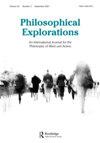Extending knowledge-how
IF 1.1
3区 哲学
0 PHILOSOPHY
引用次数: 1
Abstract
ABSTRACT This paper examines what it takes for a state of knowledge-how to be extended (i.e. partly constituted by entities external to the organism) within an anti-intellectualist approach to knowledge-how. I begin by examining an account of extended knowledge-how developed by Carter, J. Adam, and Boleslaw Czarnecki. 2016 [“Extended Knowledge-How.” Erkenntnis 81 (2): 259–273], and argue that it fails to properly distinguish between cognitive outsourcing and extended knowing-how. I then introduce a solution to this problem which rests on the distribution of tasks between agent and non-biological entity. On closer inspection, I show that this solution is ultimately unsatisfactory, though its failure is instructive as it illuminates the important role played by an agent’s skilled interaction with an external entity. Drawing on key anti-intellectualist ideas, as well as on insight from cognitive psychology, I propose an account according to which what ultimately matters for extending knowledge-how is whether a hybrid ability is self-regulated. In closing, I illuminate the practical value of extended knowledge-how vis-à-vis cognitive outsourcing.延长知道
本文探讨了在反知识主义的知识如何方法中,知识状态如何被扩展(即部分由有机体外部的实体构成)。首先,我将研究Carter、J. Adam和Boleslaw Czarnecki在2016年提出的“扩展知识如何”(extended knowledge-how)。Erkenntnis 81(2): 259-273],并认为它未能正确区分认知外包和扩展知识。然后,我介绍了一个解决这个问题的方法,它依赖于agent和非生物实体之间的任务分配。经过仔细检查,我发现这个解决方案最终是不令人满意的,尽管它的失败是有启发性的,因为它说明了代理与外部实体的熟练交互所起的重要作用。根据关键的反智主义思想,以及认知心理学的见解,我提出了一种解释,根据这种解释,扩展知识的最终问题是——混合能力是否自我调节。最后,我将通过-à-vis认知外包阐明扩展知识的实用价值。
本文章由计算机程序翻译,如有差异,请以英文原文为准。
求助全文
约1分钟内获得全文
求助全文

 求助内容:
求助内容: 应助结果提醒方式:
应助结果提醒方式:


